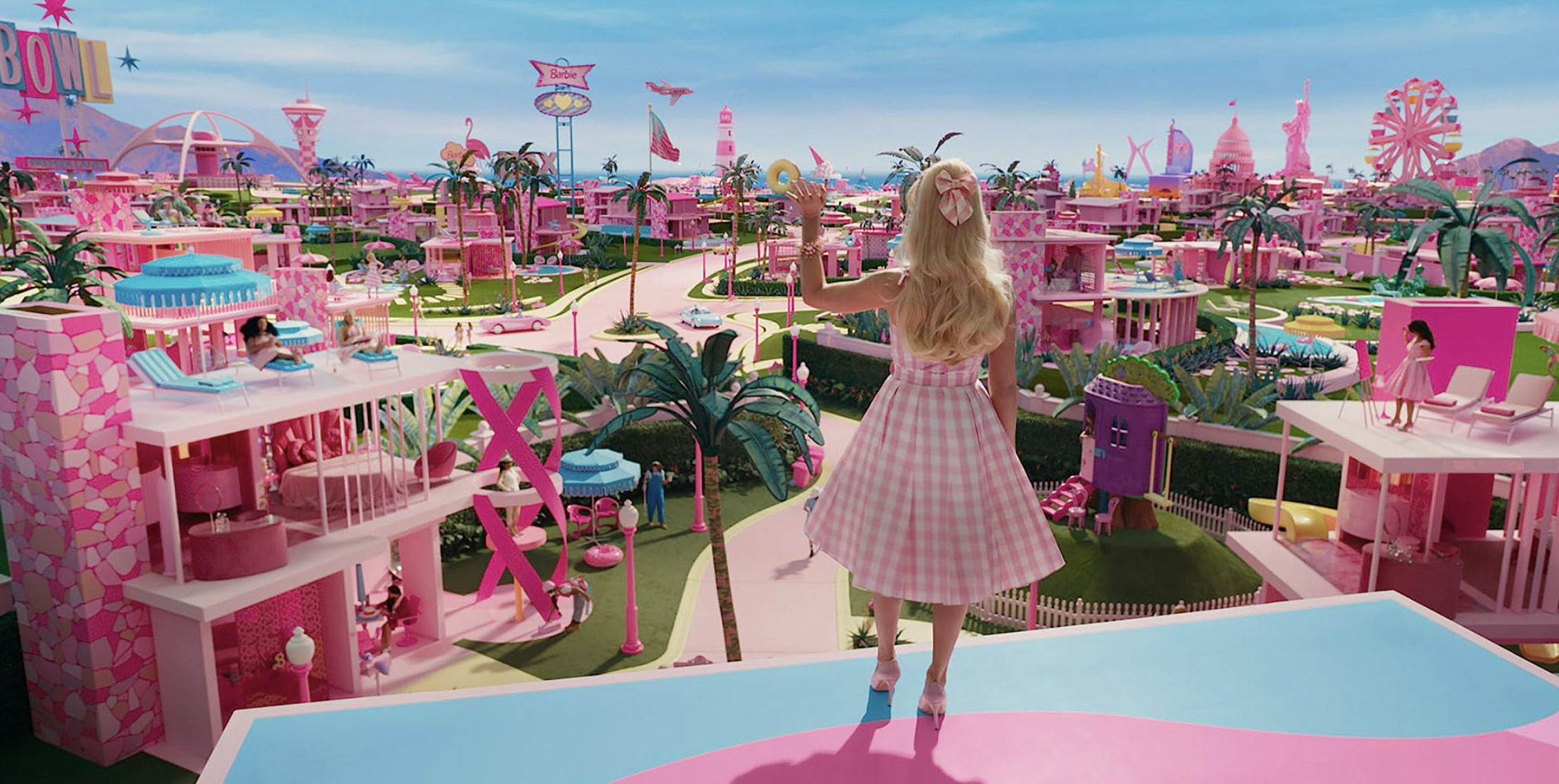There’s hype, and then there’s the Barbie World we’ve inhabited for the past year. Margot Robbie’s red carpet outfits and Ryan Gosling’s self-effacing interviews; the behind-the-scenes glimpses of the duo rollerblading in garish neon; the imagined competition with Christopher Nolan’s Oppenheimer offering readymade thinkpieces about the contrast between male and female directorial visions; the blinding pink outfits worn by opening weekend moviegoers—all this is a much a part of the Barbie experience as Greta Gerwig’s two-hour movie itself. And it worked! People are walking into the theater as pre-made fans, so that even though the trailers give away some of the best jokes from the first third of Barbie, they won’t spoil the laughs so much as make the converted feel like they’re rewatching what’s already their favorite movie.
When hype balloons to such proportions, our responses are predetermined: You either accept what you see as the fulfillment of all you were promised or you lash out in disappointment and bewail the cynicism of the promotional machinery. But what if, as a little experiment, we calibrate our response and approach Barbie as a mere movie? I realize that’s like asking us to consider Barbie a mere doll, the one impure thought the movie never permits. And in addition to crafting an experience as designed to release pent up communal girlie energy as Magic Mike XXL (though in an infinitely more chaste manner), Gerwig has critic-proofed Barbie with very funny (and accurate) jokes about the pompous tastes of men. Still, at the risk of sounding like the Ken who lectures one of the Barbies on Stephen Malkmus’s stylistic debt to Lou Reed (yes, that actually happens, and yes, you will hear from my lawyers, Greta) I gotta be the bore who critically peeks under the hood of Barbie’s Star Vette.
If we’re gonna approach Barbie as a movie, rather than an event, it helps to think of Gerwig as a director of genre pictures. With Ladybird and Little Women, two nearly perfect films, she ingeniously overhauled the coming-of-age story and the literary adaptation without undermining the genres themselves. And that’s also what Gerwig does here, though the genre is… well, what should we call it? How about “the self-aware IP meta-comedy cash-in”? For context, think back to The Addams Family or A Very Brady Movie in the ’90s (or, if you really hate yourself, Dragnet), or even Josie and the Pussycats, and then consider how the genre's shortcomings were sidestepped even if its parameters weren’t transcended in The Lego Movie.
Barbie soars blithely above the hackiest of those examples. Though the film turns on the comic implications of plopping impossible stereotypes into the real world (in ways that occasionally/unfortunately reminded me of The Year Without a Santa Claus), Gerwig’s irony is never snide. While some gags exist just to reassure us that we’re not the sort of audience that’d watch a Barbie movie unless we knew it offered a “smart take,” most of the in-jokes are designed instead for Barbie connoisseurs: the names of the outfits, the discontinued toys, and other intricacies of Barbie lore. Gerwig takes Barbie seriously as a cultural artifact whose resonance in the life of girls and women is worth exploring, and why shouldn’t she?
The joke, as laid out by Helen Mirren’s occasionally too wry narrator, is that the Barbies believe the Mattel party line that they’ve inspired girls to succeed in the Real World. So when Robbie’s Barbie (aka Stereotypical Barbie), suddenly afflicted by cellulite and Gerwiggy intimations of mortality, must venture into the Real World (or at least Los Angeles), she’s shocked to discover the failure of Barbie feminism, to put it mildly. She also experiences feelings: As passersby mock her and Ken at Venice Beach, she muses “I don’t have a word for it but I feel… conscious of my... self.”
Meanwhile, Ken discovers that men in the Real World are so respected that they even get to be doctors, and he sets out to learn all he can about the patriarchy and horses, which he intuits are somehow interconnected. And of course the perennial nonentity would be susceptible to such fantasies of power—what is dickless Ken but the original incel? He’s forever just another accessory to his dream girl, eager to spend the night with Barbie but with no idea why. Gosling’s Ken, poised perpetually on the verge of understanding a concept but never crossing the threshold, is, if anything, too good—he not only steals the picture but nearly blows it wide open. (And he once more makes me wonder why we need that other Ryan at all.)
But Robbie holds the film together with her more difficult role. She has a gift for projecting a guilelessness that’s never stupid, radiating the self-involved sweetness that makes Gerwig’s fantasy possible. Her Barbie is an extension of her Sharon Tate in Tarantino’s Once Upon a Time… in Hollywood; the sunny California girl who sees her carefree assurance reflected back to her when she watches herself onscreen now takes her beauty and value for granted as she waves to all the other Barbies each morning. Dressed adorably by costume designer Jacqueline Durran, Robbie truly seems like a being that could descend from the upper floors of her Dreamhouse without using stairs.
Barbie’s visual pleasures are exquisite. When Gerwig namedrops Powell and Pressburger or Jacques Demy in interviews, it’s not (entirely) the usual smokescreen a name director puffs out to camouflage their commercial work as aesthetically noble. She’s learned how to visually overwhelm from the best—the color scheme of Barbie Land is a kind of weaponized bubblegum Technicolor. Designer Sarah Greenwood and decorator Katie Spencer make the artificial feel real on its own terms, crafting an impeccable Barbie Land, from our cutaway view of Barbie Dreamhouse to the solid waves on the beach, and inventively dismantling their creation when that world takes a dystopian turn later in the film.
Yeah, Gerwig’s showing off here. She directs a mock battle scene with a choreographed precision that puts to shame the slam-the-action-figures-together routine we settle for so often, and there’s a musical number even more impressive than the disco extravaganza you’ve seen in trailers. Honestly, if all that came from this project was the image of Robbie’s feet emerging from her stiletto mules to stay perfectly balanced on their toes, Barbie would be an achievement.
There are laughs here I can’t imagine coming from anyone but Gerwig and co-writer/partner Noah Baumbach—a depressed Barbie who can’t stop watching the BBC’s Pride and Prejudice, or Barbie's sulky response to being called a fascist: “I don’t operate the rail system or control the flow of commerce.” (I dare you not to hear that line in Gerwig’s voice.) But sometimes Barbie is too great for its own good. The hilarious and unexpected moments show up as simply amusing in a rote summer comedy way. Fine comedians like Will Farrell and Kate McKinnon can’t quite commit with the precision that Robbie and Gosling bring to their roles; they’re “acting funny” while the stars let us discover the humor in their characterizations ourselves.
But honorable mention goes to America Ferrera as the mom of a Barbie-loathing tween, who provides the bridge between fantasy and reality that restores order to Barbie Land. When she delivers a breathless monologue about the contradictions that women navigate daily, there’s a cutting honesty that contrasts with the more predictably emotive moments. Rhea Perlman tries to remove as much ick as she can from her scenes as Barbie creator Ruth Handler, but the intertwining of sentimentality and brand-awareness affected my stomach the same way as hearing an NPR acknowledgement that Dow Chemical is sponsoring an upcoming segment on climate change does.
Critics and other consciously astute admirers are already predictably viewing Barbie in antiquated terms of subversion from within, praising Gerwig for “how much she gets away with.” But that’s the wrong yardstick. We live in an age of depressed minute steaks and existential fast food chains. Brands have learned that self-awareness and even self-deprecation can be harnessed in the service of consumption. When a table of tweens level the traditional right-thinking criticisms of Barbie as a symbol of rampant consumerism who makes women hate their real bodies, the movie’s winking acknowledgement that any cultural icon has a complicated legacy neutralizes the critique.
Similarly, McKinnon’s Weird Barbie, who was mutilated by a child like so many actual Barbies have been, demonstrates that even what little girls imagine as their individual response to their toys can be integrated as just another bit of Barbie lore. (I’m reminded of The Lego Movie’s assertion that the ultimate freedom is to be able to mix-and-match your speciality Lego sets.) Regardless of the ironic twists and turns, no matter how insightful the script is about womanhood or patriarchy, all that matters ultimately to Mattel is that we're shown how Barbie is central to how women process their identities. Barbie is an idea, we’re told; implied is the sense that she cannot fail but only be failed (sometimes even by Mattel itself). The company would rather you think of Barbie as a fascist gateway to eating disorders and self-loathing than to express the most heretical thought of all: That Barbie is just a toy.
That doesn’t take away from Gerwig’s achievement here, or at least that doesn’t take too much away. The best Hollywood director of her generation has plunged into the muck of IP and emerged with her craft, sensibility, and vision unscathed. And I’m not gonna knock a blockbuster Barbie movie with insight into gender roles, even if that insight is that they’re perpetually frustrating, especially when it’s this funny. As Sonic might put it (or, Amy Rose, more likely), there is no objective analysis of gender outside of commodity fetishism under capitalism. (Kinda wordy, I know. That’s why they don’t let me make memes.) And the film’s final joke, about a true landmark on Barbie’s path to self-discovery, is perfect.
GRADE: B+
Barbie opens in area theaters this weekend.






